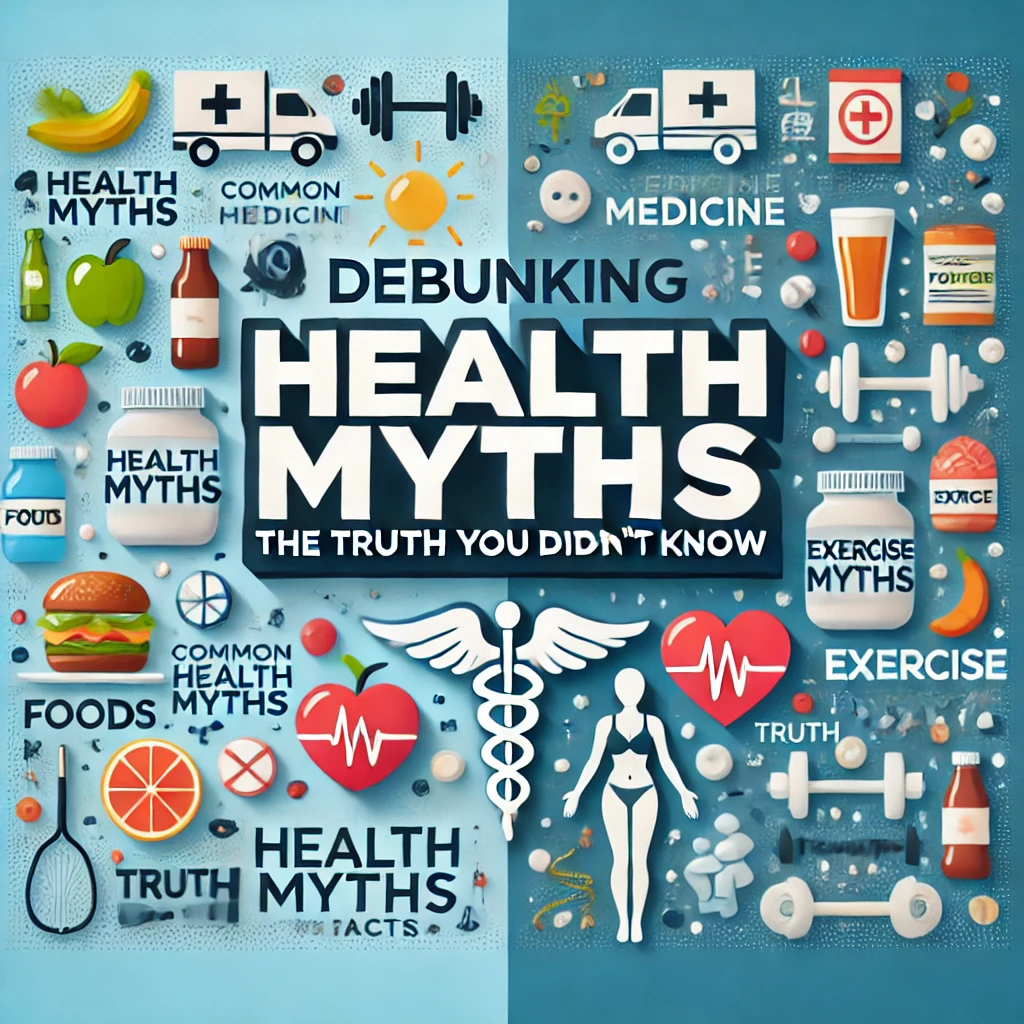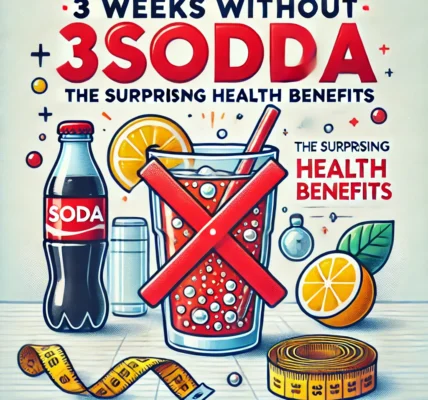In today’s fast-paced world, health advice is everywhere—from social media to well-meaning friends. However, not all of the information we encounter is accurate. Many widely believed health “facts” are, in reality, misconceptions or myths that have been passed down over time. Some of these myths can lead to unnecessary worry, while others may even harm our well-being if followed blindly.
In this article, we will explore and debunk some of the most common health myths, revealing the truth behind these misconceptions. Armed with evidence-based information, you’ll be able to make better choices for your health.

1. Myth: Eating Fat Makes You Fat
For years, people believed that eating fat would inevitably lead to weight gain. This myth is rooted in the idea that fat is a high-calorie nutrient, and consuming it must result in added body fat. However, the relationship between dietary fat and weight gain is more complex.
The Truth:
Healthy fats are an essential part of a balanced diet and do not automatically cause weight gain. In fact, fats, such as those found in avocados, olive oil, and nuts, are critical for brain health, hormone regulation, and absorbing fat-soluble vitamins (A, D, E, K). Weight gain occurs when there is a caloric surplus, regardless of the source of those calories.
- Tip: Focus on consuming healthy fats in moderation as part of a balanced diet, rather than avoiding them altogether.
2. Myth: You Should Drink 8 Glasses of Water Every Day
The idea that everyone needs to drink eight glasses of water per day has been widely accepted, but this “one-size-fits-all” recommendation isn’t entirely accurate.
The Truth:
Hydration needs vary depending on individual factors such as age, gender, physical activity, and climate. While staying hydrated is essential, some people may need more or less water than the suggested eight glasses. Additionally, water intake can come from other sources, such as fruits, vegetables, and beverages like tea.
- Tip: Listen to your body and drink when you’re thirsty. Adjust your intake based on activity levels and environmental factors.
3. Myth: Carbs Are Bad for You
Carbohydrates have been unfairly demonized, especially with the popularity of low-carb diets like keto. Many people believe that all carbs contribute to weight gain and should be avoided for optimal health.
The Truth:
Not all carbs are created equal. While refined carbs (like white bread and sugary snacks) can contribute to weight gain and health problems, complex carbs (such as whole grains, fruits, and vegetables) are a vital source of energy and nutrients. Eliminating all carbs can lead to nutrient deficiencies and reduced energy levels.
- Tip: Focus on consuming complex carbohydrates in moderation as part of a healthy diet, and avoid highly processed carbs.
4. Myth: You Need Supplements for Optimal Health
The supplement industry is booming, with many people believing that they need to take daily vitamins or supplements to be healthy. While supplements can be helpful in some cases, the idea that they are necessary for everyone is a common misconception.
The Truth:
For most people with a balanced diet, supplements are unnecessary. Whole foods provide the majority of the nutrients your body needs. However, there are exceptions for those with specific deficiencies, medical conditions, or dietary restrictions (such as vegans needing B12 supplements).
- Tip: Before taking supplements, consult with a healthcare provider to determine whether you truly need them.
5. Myth: You Should Avoid Eating Eggs to Lower Cholesterol
For many years, eggs were seen as a cholesterol-raising food, leading to recommendations to limit egg consumption, especially the yolk. But more recent research has debunked this myth.
The Truth:
Dietary cholesterol found in eggs does not have a significant impact on blood cholesterol levels for most people. In fact, eggs are a great source of high-quality protein and important nutrients such as vitamin D and choline. The link between cholesterol in food and heart disease risk is more complex, and other factors (like saturated fat intake) play a more critical role.
- Tip: Feel free to include eggs in a balanced diet unless you have specific health conditions that require limiting cholesterol intake.
6. Myth: Organic Food Is Always Healthier
Many people believe that organic food is automatically healthier than non-organic alternatives due to its lack of pesticides and synthetic chemicals. This has led to a significant increase in the popularity and cost of organic products.
The Truth:
While organic farming practices do avoid synthetic pesticides and fertilizers, there is limited evidence to suggest that organic foods are significantly more nutritious than conventionally grown foods. The health benefits of organic food depend on various factors, including how it’s grown and the specific food in question.
- Tip: Whether you choose organic or conventional produce, focus on a diet rich in fruits, vegetables, and whole foods. Washing produce thoroughly can help reduce pesticide residue.
7. Myth: Eating After 6 PM Causes Weight Gain
Many diet plans advise avoiding food in the evening to prevent weight gain, with the idea that eating late at night leads to fat storage due to a slower metabolism.
The Truth:
Weight gain is determined by the total number of calories consumed versus burned, not by the time of day you eat. While late-night snacking can lead to overeating (especially if unhealthy snacks are involved), eating after 6 PM itself does not cause weight gain.
- Tip: Focus on portion control and the quality of the food you eat, regardless of the time.
8. Myth: Detox Diets Cleanse Your Body
Detox diets, cleanses, and “juice detox” programs claim to rid your body of toxins and jumpstart weight loss. These diets often involve drinking only liquids for a few days or avoiding solid foods altogether.
The Truth:
Your body is already equipped with organs like the liver and kidneys that naturally detoxify the body. There is no scientific evidence to support the idea that detox diets improve health. In fact, extreme detox diets can lead to nutrient deficiencies, fatigue, and dehydration.
- Tip: Focus on maintaining a balanced, healthy diet that supports your body’s natural detoxification processes.
9. Myth: You Need to Eat Small Meals Frequently to Boost Metabolism
The idea that eating small, frequent meals throughout the day speeds up your metabolism and helps with weight loss has been popular in fitness circles for years.
The Truth:
There is no significant evidence that eating more frequent meals increases your metabolism. What matters more is the total number of calories you consume throughout the day. Some people may benefit from more frequent meals to manage hunger or blood sugar, but it’s not a magic solution for everyone.
- Tip: Find a meal schedule that works for you, whether it’s three larger meals or five smaller ones, based on your preferences and lifestyle.
10. Myth: You Can Target Fat Loss in Specific Areas
Many fitness programs claim that you can lose fat from specific areas of the body through targeted exercises, such as doing crunches to reduce belly fat.
The Truth:
Spot reduction—losing fat from a particular part of the body by exercising that area—does not work. Fat loss occurs throughout the entire body as you burn calories through exercise and a healthy diet. Strength training can tone muscles in specific areas, but overall fat loss is needed to see visible results.
- Tip: Focus on a combination of cardio, strength training, and a balanced diet to reduce overall body fat.
Conclusion: Be Informed and Stay Healthy
Many health myths have been passed down for generations, often without any scientific backing. By debunking these common myths, you can take better control of your health and make informed decisions based on facts rather than misinformation.










